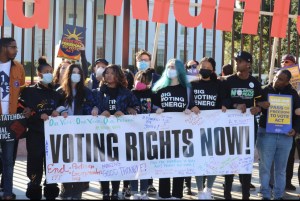By Reginald Williams,
Special to the AFRO
If Congress acts quickly enough, Kevin Jackson just may survive the disease that is trying to suffocate him.
Each month he has to come up with $3,000, his co-pay for a 90-day supply of nintedanib. The cost without insurance lands somewhere near $20,000.
Sold under the name Ofev, the oral medication treats people with pulmonary fibrosis, a lung disease affected by severe scarring.
Jackson, a licensed clinical professional counselor, was diagnosed with interstitial pulmonary fibrosis in 2012. His lungs are filled with small nodules that create scarring. The fibrosis’ side effects include bouts of losing air, which causes intense coughing spells, and the former athletic standout’s mean arterial pressure levels regularly dip in the low 60 millimeters of mercury, barely enough to send oxygen to the brain.
Ofev, approved by the Food and Drug Administration in 2014, according to medical experts, can slow the progression of lung scarring.
In Jackson’s attempt to improve the quality of his life, the cost to improve his health is excessive and frustrating for the U.S. Marine Corps veteran of 33 years.
“It’s frustrating. It makes me angry. There is a sense of betrayal. Ultimately, it’s the state of humanity. In our state of humanity, we are greedy—and we do not work for the good of the whole. We work for the good of the one,” said Jackson with regards to the government’s duplicity in his diagnosis.
While the 27 European Union countries regulate drug prices by negotiating directly with pharmaceutical companies or Big Pharma as they are known, set their prices without interference from the government.
Many Americans, including Jackson, believe the medicine monopoly is rooted in greed and their intimate government relationships. Research reveals that pharmaceutical and healthcare products spent more than $300 million in 2022 lobbying Congress. The Pharmaceutical Research & Manufacturers of America (PhRMA), the No. 1 individual pharmaceutical lobbyist, spent $29.2 million.
“Humanity has a problem with greed. It will always look after its self-interest, and that’s how I look at Big Pharma,” explained Jackson. “Big Pharma is unfortunately imprisoned by their own arrogance, believing themselves to be making money for the benefit of all, supposedly so that they can altruistically give—yet not recognizing that there’s a little old dude in Bowie, Maryland, who needs some pills, and they want to charge him $3,000 for 90 days of pills.”
Ofev does not have a generic equivalent. The patent, held by Boehringer Ingelheim International, for the drug specifically needed by Jackson expires on Dec. 20, 2025. There is no incentive for a pharmaceutical company to reduce the cost of a drug while they own the patent. The goal for a company is to earn as much revenue as possible before the drug loses its exclusive rights. The expiration of the drug’s patent makes way for generic offerings at a reduced cost.
Jackson’s frustration with the high fee for his medicine begins with his vexation with the federal government. In 1991, after a six-month military tour in Saudi Arabia, Jackson believes the onset of his lung issues began with exposure to toxic fumes from ground pits while deployed during the war with Iraq.
“I’m confident that it started when I was in Saudi Arabia in those ground pits, breathing in that dust,” said Jackson. “I remember when I arrived home from Saudi Arabia; I felt tired all the time. My joints started hurting, and I felt weighed down. My legs were heavy. The things I used to be able to easily do became much harder to do.”
After fighting on foreign soil for the liberation of Kuwait, Jackson now fights on a domestic minefield to get the United States to recognize that his illness is most likely the product of his service time in Kuwait. Engaged in a two-decade battle, Jackson maintains the government has laid the responsibility upon him to prove to the military that his illness is service-connected.
“The VA (Veterans Administration) says we’re here for you. But that’s the political response,”said Jackson. “They will say to anybody, ‘We will help you. We will support you. We’ll be there for you when you can prove that which you are going through happened as a result of being connected to the service.”
The government’s unwillingness to provide the quality of service that Jackson served his country with, compounded by the government’s complicity in allowing healthcare companies to charge extortionist drug fees metaphorically, is taking Jackson’s breath away.
“The government is good for pulling the rug from under you—failing to deliver on what they promise. But then they will try to create this story as a rationale regarding how their bait-and-switch policies are best for you. I struggle with this,” said Jackson.
The government is indifferent and Big Pharma is the “big issue.”
“To get something out of the ground and formulate it so that it can have some benefit for humanity, but by the way, you need to pay more than $12,910 for a 60-day supply—c’mon man. For real, man! It’s not whether I can afford it. Is it fair? Is it just? But that goes to the heart of man,” he continued.
Reginald Williams, the author of “A Marginalized Voice: Devalued, Dismissed, Disenfranchised & Demonized” writes on Black men and Holistic Health concerns. Please email bookreggie@reginaldwilliams.org or visit amvonlinestore.com for more information.
The post A Marine Corps vet’s battle to breathe is part of a fight against ‘Big Pharma’ appeared first on AFRO American Newspapers .











